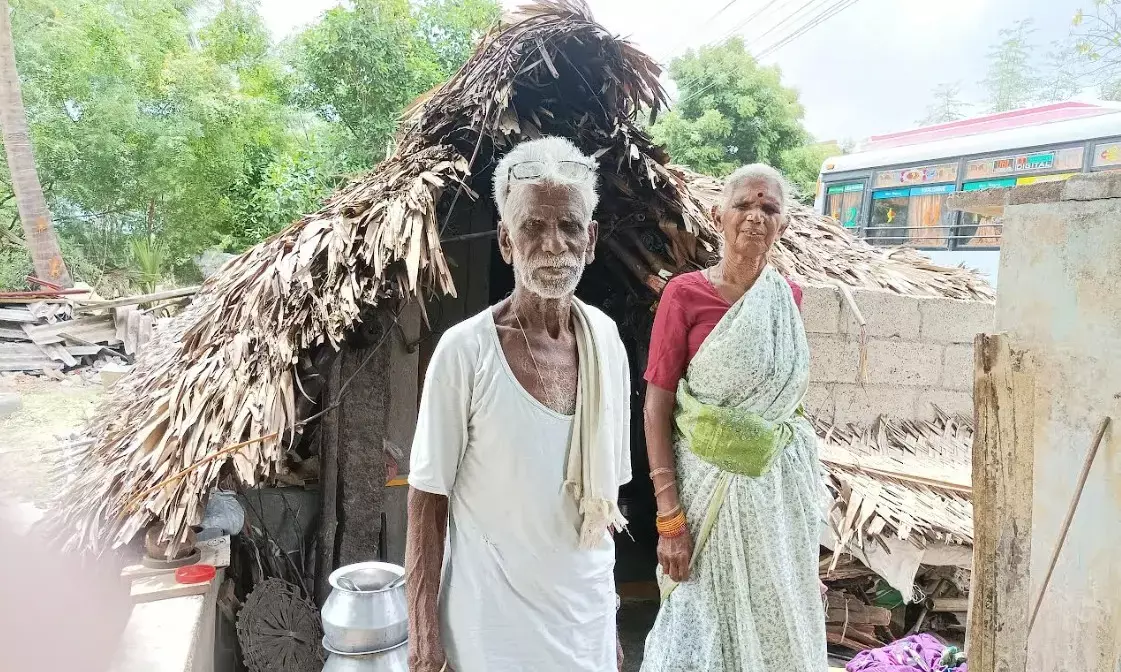India 75 - 'Life Does Get Tougher'
Independence Day special series

The Citizen concludes its three part Independence Day Specials from different capitals with these voices from Tamil Nadu. BLESSY MATHEW PRASAD speaks to senior citizens who have not reaped independent India's harvest although they have taken the journey with her.
Balaraman, 82
Eighty two-year-old Balaraman couldn't hold his tears back. His house was about to get demolished. The menacing bulldozers had arrived early in the morning and Balaraman and his neighbours had no choice, but to watch in horror as their homes were struck down.
Residents of Madurapakkam, a village in Tamil Nadu, which only has about 70 families, were told that since they were living in a low-lying area close to the lake, they were prone to floods and needed to relocate. They had received the notice six months ago. But the residents had protested saying that they need to live near the lake as most of their livelihood depends on that.
However, their reasoning and the protests were ignored. One morning they woke up to a rude shock. The bulldozers had arrived.
The villagers claim that the actual reason for the demolitions is probably to make way for bigger residential complexes. They say such a project garners more profit for the local authorities. How unfair it is that 75 years after Independence, it is still the poor who have to pay the price for development, without reaping any of its benefits.
Balaraman fondly recalls how trouble free his childhood was. "I grew up in the Tindivanam municipality area. I have fond memories of growing up there. I used to play happily with my friends. All around us were beautiful fields. My parents, who were farmers, seemed to be living a pretty decent life. We even had a hospital and a park nearby.
"But everything changed when my mother died. I was in sixth grade. I was forced to drop out of school and come to this village. I've been living here since then. For the first few weeks, the villagers took care of me and helped me cope. But soon another tragedy struck as some people cheated me and took away all my assets, including my land. I was left with nothing.
"When I went to ask them to return it, they beat me up. I went to court, paid the lawyer whatever I had to get the land deed changed. I even won the case. Yet, the powerful people here ensured that I don't get back what rightfully belonged to me.
"I started doing hard labour. I worked as a mason and a lot of other odd jobs. I eventually got married, and we have three kids. They're all grown up now. We've managed to educate them well, they are all doing pretty well in life but they don't help us.
"This village didn't even have electricity for a long time. It was just a few years ago that a Christian social worker came here and helped around 42 households get electricity, including mine. But because she was a Christian, my relatives had a problem with it. They started threatening me saying if I allowed her to help, I would be forced to convert to Christianity. But that was not true. I tried to assure them that that wouldn't happen.
"Now we're back to living without electricity. It's been out since the demolitions began. We are uncertain about where we will go if they continue the demolitions. There's been no communication. As far as we know, the lower castes have been compensated with some other land, but our caste people haven't received any information yet, although we are all below-poverty line families.
"I don't even get the promised pension. These people are taking away everything, my entire livelihood, my entire life and saying they will compensate us. But how can you really compensate with just some money? It's more than that. How can we learn to live elsewhere? Even after 75 years of Independence, I feel like life has become even more difficult for me."
Neelarun (76)
Seventy six-year-old Neelarun has spent his entire life in Ponmar, his parents were farmers. Neelarun has hardly ever stepped out of here, and didn't even go to school. Since childhood, he helped his parents in the field everyday. It was not easy work. He didn't have much time to play. Farming was all he knew.
As he grew up, he worked harder, got married and managed to educate his four kids. Neelarun always wanted to study, so he's really glad that he was able to provide his children with the opportunity.
For close to 65 years, Neelarun worked as a farmer. But as age caught up with him, the occupation began to get difficult for him. He couldn't handle the hard labour anymore, so he found another job as a watchman for a nearby gated community. Neelarun is grateful that now he earns a decent salary, compared to what he used to earn through farming.
Trying to recall his childhood and how life was immediately after Independence, he says, "I don't really remember much. We didn't know what was happening in the world outside. We were just living in our cocoon. But life has surely changed since then. In those days, there were no buses or means of transport. I used to walk for hours. Nowadays, it's so much easier because there are different modes of transport.
"There were no hospitals either. In fact, even now the hospital is really far from our village. When my wife had jaundice, we found it very difficult to get her treated because of how far it was. She eventually died. This was just a few years ago.
"Education is only the way forward. I don't expect everything to be handed out to us freely. I'm glad that my children were able to finish school. At least they will have a better life than I did.


